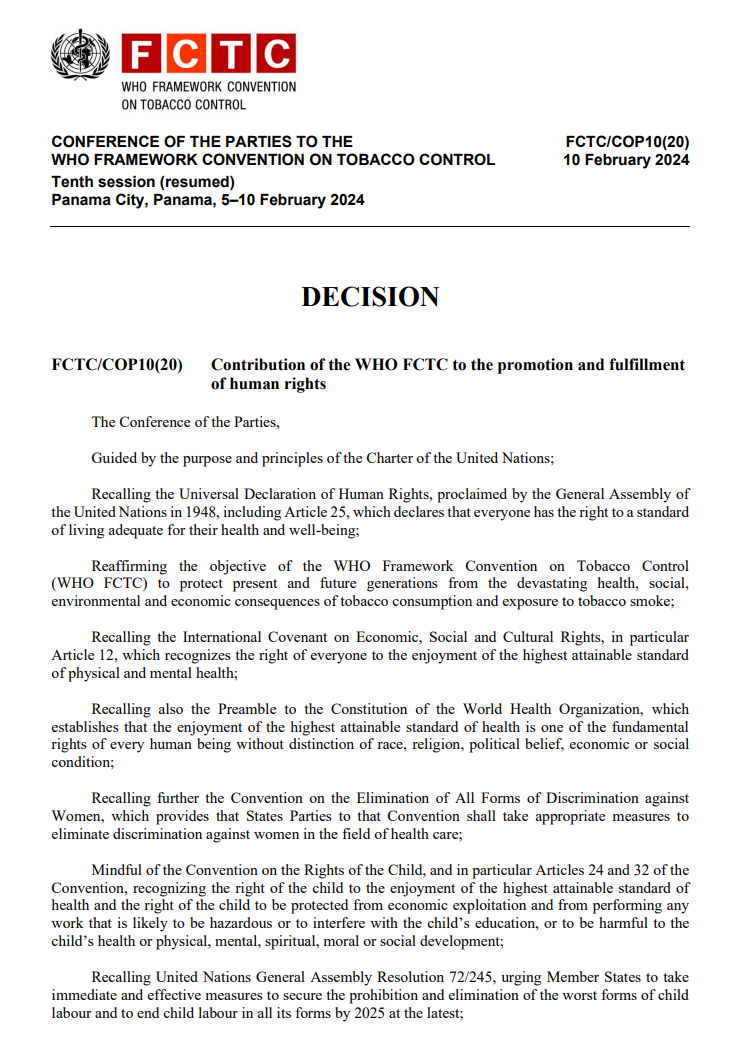The tenth Conference of the Parties (COP 10) of the WHO Framework Convention on Tobacco Control (FCTC) adopted a series of key Decisions including Decision FCTC/COP10(20) Contribution of the WHO FCTC to the promotion and fulfillment of human rights.

ASH is a proud supporter of this Decision adopted by the COP, the governing body of the Framework Tobacco Control, composed of 184 Parties (183 countries and the European Union).
The Decision encourages alignment with UN Human Rights Mechanisms and “requests the Convention Secretariat to foster coordination and collaboration with entities in the United Nations system pursuing human rights mandates in order to raise awareness of the importance of the WHO FCTC implementation in the fulfilment of human rights.” The Secretariat will report back on Human Rights at COP 11.
Key Elements of the COP10 Human Rights Decision:
- This Decision on human rights cements the connection between human rights and tobacco control.
- The Decision recalls numerous international human rights instruments including:
- The Universal Declaration of Human Rights
- The International Covenant on Economic, Social and Cultural Rights
- The Convention on the Elimination of All Forms of Discrimination against Women
- The Convention on the Rights of the Child
- The Decision also recalls other international instruments, such as:
- The Preamble to the Constitution of the World Health Organization
- United Nations General Assembly Resolution 72/245
- The 2030 Agenda for Sustainable Development
- The Decision also points to several articles of the FCTC and previous FCTC Decisions, including:
- Article 2.1 – forward looking measures (tobacco endgame),
- Article 5.3 – protecting public health policy from tobacco industry interference,
- Decision FCTC/COP7(26) concerning international cooperation for implementation of the WHO FCTC, including on human rights,
- Decision FCTC/COP7(29), which re-emphasized that the enjoyment of the highest attainable standard of health is one of the fundamental rights of every human being,
- The Guidelines for implementation of Articles 8 (100% smoke-free environments) and 12 (strengthening public awareness of tobacco control issues) of WHO FCTC.
Next Steps: How to Connect the WHO FCTC with Human Rights Mechanisms
- The Human Rights Decision will help to ensure whole of government approaches to tobacco control regulations and human rights, building on this Decision.
- In particular, this Decision can be used to highlight the contribution that the WHO Framework Convention on Tobacco Control can make to the goals of numerous mechanisms with UN mandates including the Human Rights Council, the Committee on the Elimination of Racial Discrimination (CERD), the Committee on Economic, Social and Cultural Rights (CESCR), the Committee on the Elimination of Discrimination against Women (CEDAW), the Committee on the Rights of the Child (CRC) and other mechanisms such as the UN Summit for the Future.
- There are two major elements to the Decision. Civil society can support both when working within human rights mechanisms and with the FCTC Secretariat. The decision:
- “ENCOURAGES Parties to consider including WHO FCTC principles and implementation efforts when engaging with the United Nations human rights mechanisms;
- REQUESTS the Convention Secretariat to foster coordination and collaboration with entities in the United Nations system pursuing human rights mandates in order to raise awareness of the importance of the WHO FCTC implementation in the fulfilment of human rights.”
ASH is a longtime leader in highlighting the negative human rights impacts of the tobacco industry and the positive contribution of the WHO FCTC to advancing human rights goals. Visit our Tobacco and Human Rights Resource Hub here>
Contact the ASH Team with any additional questions at info@ash.org.








